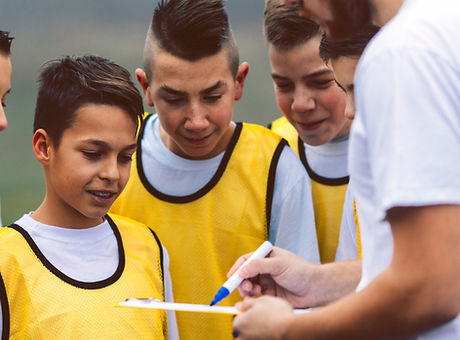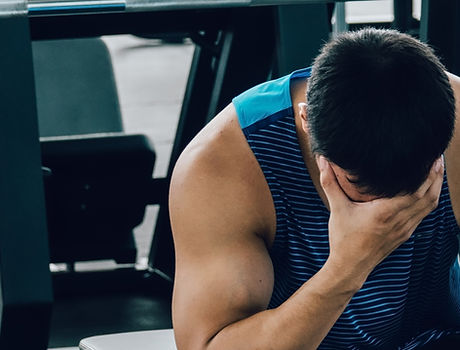COACHING THE WHOLE ATHLETE
Supporting coaches and sport administrators in ongoing personal and professional growth; equipping them with the knowledge, tools, and skills to empower their athletes to thrive on and off the field.


Kicking off 2023 with some positive words from our Fall 2022 Atlantic Coast Conference Cohort participants. These coaches devoted much of their time this fall to doing the personal and professional reflective work to continue becoming the best leader, mentor and support that they can be for their athletes, staff and athletic communities! Thank you coaches!
Check out our new guest blog post by former collegiate track and field athlete (Bowdoin College) and poet, Dylan Welch.
He shares his running journey from high school standout, to his chase for greatness and struggle with external motivators. We hear how a long bout with injury helped him to finally explore and understand who he is beyond the track and pave a path for a new journey both inside and out of running.

How do I develop, and model, a coaching philosophy that
empowers my athletes and fosters intrinsic motivation?
What practices can I adopt to tap into
my athletes' strengths and improve engagement?
How do I ensure that my athletes feel that they are valued and can develop agency in their athletic growth?
How can I evolve my relationship with my athletes that will contribute to their success both on and off the field?
If these are important questions to your coaching or athletic culture, reach out!
THOUGHTS FROM OUR ATLANTIC COAST CONFERENCE COACHES
Check out a culmination of what we have been doing to evolve the coaching practice: sparking conversation/reflection on what it means to be an effective coach AND exploring/actualizing ways that we can grow and adapt to better support the needs of the whole athlete. With new knowledge and skills of a humanistic approach our coaches have begun to build their toolbox to create a more positive and healthy environment for their athletes to thrive in and have already taken action to integrate practical strategies of an empowering athletic climate.
Our emphasis on the learning community that we have created as coach developers is equally important, ensuring that in this space our coaches needs are at the forefront, they are provided individualized support and they are empowered to have autonomy and utilize their voice to shape their learning experience.
The abstract is now featured in the International Sport Coaching Journal which was presented at the International Council for Coaching Excellence Global Coach Conference this past week.
Grateful to have been able to connect, brainstorm and learn from others in the field and look forward to building these new relationships and collaborating to take ACTION on many of the key learnings!
Interview with Steve Underwood of National Scholastic Athletic Foundation
We discuss my experience as an athlete and how it has informed my work and the creation of Coaching the Whole Athlete, what humanistic coaching is and much more!
COACHING THE WHOLE ATHLETE
An 8-week virtual coach development program designed to ensure that
coaches, from youth through elite level, can integrate elements of humanistic coaching into their personal coaching approach to effectively support the whole athlete. By the end of the program, coaches will be able to...
Identify elements of an empowering coaching approach to develop the whole athlete and achieve more positive athlete outcomes
Determine skills and tools that can be used to create a culture of athlete agency, responsibility and intrinsic motivation
Review and evolve their coaching philosophy to ensure that it models a whole athlete approach
Adopt strategies and tools of whole athlete coaching that they can bring back to their own teams
Reflect on how effectively they apply these coaching principles and identify opportunities for ongoing development
WHAT YOU CAN EXPECT
The program will facilitate understanding of key theories, utilizing interactive discussions and activities as well as offer personalized support. By actively engaging in the program, and applying key learnings, coaches will develop a greater awareness of their impactful role as a positive mentor in their athletes’ lives. They will learn strategies and skills to foster an empowering athletic climate that leverages athletes’ strengths and supports them in reaching their potential. Details for each workshop can be found below.
COACHING AS AN EVOLVING PROFESSION

During the first workshop coaches will receive an introduction to the program including program roadmap, goals and learning approach. Coaches will have the opportunity to discuss and define their coaching philosophy, reflect on what it means to be an effective coach and review traditional models of sports coaching in comparison to a humanistic coaching approach to develop the whole athlete.
ADOPTING AN ATHLETE-CENTERED APPROACH

Coaches will reflect on the main characteristics of athlete-centered coaching and how this compares to a coach-centered approach. They will apply these learnings to their own team environments, brainstorm strategies for adopting an athlete-centered approach and discuss the impact of coaching behaviors on athlete outcomes. Finally, they will learn skills to move from passive (telling) to active (asking) athlete engagement.
SUPPORTING AND MOTIVATING YOUR ATHLETES

Coaches will learn theories of motivation to help them best support and enhance athletes intrinsic drive. They will discuss athletes’ basic needs and need-supportive coaching practices that satisfy these needs in comparison to a more controlling style. Coaches will explore the difference between task and ego-oriented environments, assess their own coaching styles and learn tools for facilitating a self-referenced, mastery climate.
FOSTERING A REFLECTIVE AND FEEDBACK ORIENTED CULTURE

Coaches will discuss different forms of reflective practice that they have utilized in their coaching and understand benefits of reflective practice for personal and professional growth and identify tools that can help them in their continual development. They will observe and analyze coach feedback examples, learn strategies for providing feedback and brainstorm ways to facilitate reflection and self-awareness with their athletes. Finally, they will discuss how creating a reflective and feedback oriented culture can foster trust, understanding and connection to strengthen the coach-athlete relationship.
DEVELOPING EMOTIONAL INTELLIGENCE

Coaches will learn the four main competencies of emotional intelligence and evaluate their strengths as well as areas they would like to improve
on. They will assess a case study and determine behaviors that a coach with high emotional intelligence would demonstrate and apply this knowledge to their own coaching scenarios. Finally, they will engage in mock one-on-one athlete conversations and discuss practices they can implement to build athletes' emotional intelligence.
GREAT LEADERSHIP = GREAT COACHING

Coaches will differentiate between transformational and transactional leadership styles and then characterize coach behaviors modeled in example videos. Coaches will assess their own leadership approach in relation to the four main elements of transformational leadership and identify the impact on the coach-athlete relationship. Coaches will end with brainstorming their mission and vision statements and discuss with their peers strategies for effectively communicating it to their athletes.
EFFECTIVELY MANAGING THE CHALLENGES OF COACHING THE WHOLE ATHLETE

Coaches will discuss challenges that can arise when adopting a whole athlete coaching approach, share personal scenarios and receive feedback from peers. They will understand what it means to be an adaptive coach and when it is important to be more directive. Coaches will learn about initiatives and actions taken to address common challenges that athletes face as well as devise their own. Finally, coaches will discuss the impact of COVID-19 on their athletes and identify individuals and resources in student-athletes' web of support.
CREATING AN ACTION PLAN FOR COACHING THE WHOLE ATHLETE

Coaches will use this workshop to reflect on tools, strategies and practices that align with each element of a humanistic and empowering athletic climate. They will identify resulting athlete outcomes as well as the impact on the coach-athlete relationship. Coaches will brainstorm in groups concrete steps that they can take to integrate a whole athlete coaching approach within their teams and finally, present their evolved coaching philosophy to their peers.
PARTNERS




ABOUT BRIANNA
Hi everyone! My name is Brianna Welch and I am the founder and creator of the flagship coach development program, Coaching the Whole Athlete.
As an independent coach and consultant (Brianna Welch Coaching and Consulting LLC) I work to support leaders in education and athletics in ongoing personal and professional growth to positively transform the learning environment in which they work, whether that be in the classroom or on the field. Through my program, I engage coaches in a collaborative learning process equipping them with the knowledge and tools to foster empowering climates for student-athletes to thrive in all areas of their life.
My work extends to supporting coaches and athletes through one-on-one coaching including coach professional development, designing training plans and workouts for athletes, and mental performance coaching. Whether the focus is on evolving coaches practices to tap into athletes' intrinsic drive or supporting athletes in navigating their athletic identity and achieving balance, I adopt a personalized approach placing the needs and experiences of my client at the center. I embolden my clients to develop self-awareness, personal agency and tap into their strengths to reach their potential.
I bring a unique perspective to the coaching relationship as a long time athlete and runner, training and racing to this day. Having experienced the highs and lows of injury and achievement, worked through external pressures and came to realize my own “why” and worth, I am able to relate to the challenges my athletes are working through and provide insight to coaches to build more positive relationships with their athletes.
I hold a B.A. in Public Policy from Duke University and an M.Ed. in Educational Leadership from the University of Vermont. I have experience coaching on the DI Collegiate Level (University of Vermont) as well as high school. I began running at 7 years old coached by my mom (a DI runner herself). I am a 2x H.S. All American in the 800m, competed and captained the Duke University Women’s T&F team and ran post-collegiate for Central Park Track Club.

FIND OUT MORE
If you would like to learn more about Coaching the Whole Athlete or
any other services offered please complete the form below:







